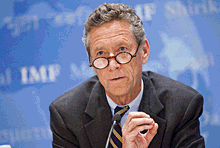
Typical street scene in Santa Ana, El Salvador. (Photo: iStock)
IMF Survey: IMF Urges Action to Tackle Unemployment, Create Jobs
September 9, 2010
- Conference aims to make unemployment more prominent in policy discussion
- Recovery in advanced economies too tepid to reduce unemployment much
- More can be done to support output growth, create jobs
- Blanchard: “I hope that Oslo does reaffirm the need for coordination in aggregate demand policies across countries over the medium run” (IMF photo)
The International Labour Organization (ILO) and the International Monetary Fund (IMF) are hosting a joint conference on 13 September in Oslo to explore new ways of generating jobs as part of a sustainable recovery from the global economic crisis.

Jobless line in New York, United States—country where half of jobless have been out of work for more than six months (photo: Frances Roberts/Newscom)
INTERVIEW WITH OLIVIER BLANCHARD
The conference on “The Challenges of Growth, Employment, and Social Cohesion,” the first of its kind, is sponsored by the Norwegian government and will be chaired by ILO Director-General Juan Somavia and IMF Managing Director Dominique Strauss-Kahn. Ahead of the conference, IMF Chief Economist Olivier Blanchard spoke to IMF Survey online about the objectives of the conference and what may result.
IMF Survey online: Why is the IMF helping to organize this conference?
Blanchard: We want to make unemployment, and the costs of unemployment, more prominent in current policy discussions. We need growth—but we need growth that increases employment. An economic recovery that does not translate into more jobs will not mean much for most people. People may not notice whether growth is 1 percent or 3 percent. In contrast, whether unemployment is 10 percent or 5 percent is a very big deal, not just for the pain it imposes on the unemployed but for the anxiety it creates for many of the employed. And when you realize that the crisis has led so far to 30 million more people becoming unemployed, you get a sense of the immense human cost of the crisis.

Blanchard: “I hope that Oslo does reaffirm the need for coordination in aggregate demand policies across countries over the medium run” (IMF photo)
IMF Survey online: From this perspective, how do you view the economic outlook?
Blanchard: It’s a mixed picture. In advanced countries, there is an output recovery, but it is just too tepid to bring about a rapid decline in unemployment. It is easy to understand the gap in perceptions between Wall Street and Main Street. Unemployment remains high, particularly in countries such as the United States and Spain. Long-term unemployment is alarmingly high: in the U.S. for instance half of the unemployed have been out of work for over six months, something we have not seen since the Great Depression. The employment outlook is better among emerging markets and developing countries than in the advanced countries. Still, those working particularly in export sectors have suffered from the crisis.
IMF Survey online: What do we know about the costs of the recent increase in unemployment?
Blanchard: We read about it daily in the newspapers—the strain on the unemployed, on their finances, their family ties, their kids. We know the costs must be high.
And we can also make some educated guesses from the academic work on the costs of past recessions and job losses. From such studies, we know that the earnings loss from unemployment is persistent. Even 15–20 years after a spell of unemployment, the people who were displaced make on average 20 percent less than comparable workers who kept their jobs.
"We have to act quickly before unemployment becomes a structural problem."
Long-term unemployment is particularly costly; it affects a person’s morale and self-confidence and how the person is viewed by others. The odds of finding a job decline the longer a person has been unemployed. In the U.S., a person unemployed for over six months has less than a 1 in 10 chance of finding a job in the coming month.
So we have to act quickly before unemployment becomes a structural problem.
IMF Survey online: What can we do?
Blanchard: Recognizing this human toll, and the risks of entrenched unemployment, our economic policies should target as quick a job recovery as possible. We have to use fiscal and monetary policies to support as strong an output recovery as we can: output growth is the single most important determinant of employment growth. And if we can reduce the uncertainty about where the economy is heading, companies will be less inclined to wait and see, and will respond to increases in sales by hiring again.
IMF Survey online: But haven’t fiscal and monetary policies reached their limits?
Blanchard: Not necessarily. Take fiscal policy. What is needed in many advanced economies is a credible medium-term fiscal consolidation, not a fiscal noose today. Once such consolidation plans are in place, then, in most countries, there is still room for well targeted fiscal measures, and these can increase output. Measures that, for example, help homeowners with underwater mortgages may well, in addition to alleviating their pain, produce an increase in demand, and a good bang for the buck. Measures that increase incentives for banks to lend to small businesses may also help both on the supply and on the demand side. I do not want to push the argument too far, but it may even be argued that, if fiscal stimulus helps reduce unemployment and thus avoid an increase in structural unemployment, it may actually largely pay for itself, and lead to only a small increase in debt, relative to the alternative of doing nothing.
IMF Survey online: And is there also room for monetary policies to act to reduce unemployment?
Blanchard: Much less so, with policy interest rates already close to zero in many countries. But monetary policy can stay accommodative over the coming quarters, particularly because there is no threat of inflation on the horizon. And if the recovery shows signs of faltering, central banks can again resort to unconventional monetary policy tools, as they did during the acute phase of the crisis. These will not achieve miracles, but they can help.
IMF Survey online: Aren’t there more direct ways of intervening in labor markets to reduce unemployment?
Blanchard: Yes. It is a bit of a caricature, but you can think of fiscal and monetary policies as roughly determining the total amount of hours worked, and of labor market measures as helping allocate these hours across workers and potentially alleviate the pain. So, clearly, extended unemployment benefits are appropriate in this context. The usual argument against them is that they decrease search, and thus contribute to increasing unemployment. While the argument has merit in normal times, it has little or no merit when there are so few jobs available. In this case, firms have no problems finding workers, and more search only leads to a game of musical chairs among the unemployed.
"Monetary policy can stay accommodative over the coming quarters, particularly because there is no threat of inflation on the horizon."
A similar argument applies to short-time work programs, the programs which give companies incentives to keep more workers on the job but at reduced hours and wages. These were used to good effect by some countries during the recession. In Germany, the unemployment rate barely budged, thanks partly to the intensive use of such programs. The usual argument against such programs is that they impede reallocation. Again, the argument has merit in normal times, but little merit in the current labor market environment. The most urgent priority is not reallocation, but a reduction in the human cost of the crisis. When employment picks up is when it will make sense to phase out these subsidies. This is actually happening in Germany.
IMF Survey online: What about subsidies for job creation?
Blanchard: They will be part of the discussion at Oslo. But it is difficult to design these subsidies to spur new hiring; one often ends up giving a subsidy for hiring that was going to be done anyway. And trying to pick the sectors that deserve subsidies runs the risk of political capture.
That said, we have to recognize that the financial sectors of many countries are still under repair. So some viable companies are cutting back operations, or new businesses are not starting up, because of lack of credit. This is particularly true of small and medium-sized companies that rely on banks to finance their investments and do not have easy access to alternate sources. So subsidies to spur hiring by such firms can be useful. But this is a stop-gap solution. The more lasting solution is to accelerate financial sector repair so that credit provision to these companies, and hence their hiring, picks up.
IMF Survey online: Do you expect the Oslo conference to make progress toward coordination in policies to solve the unemployment crisis?
Blanchard: There will be a sharing of experiences that should foster better understanding of best practices in active labor market policies. A coordination of these policies across countries is not necessary.
But I hope that Oslo does reaffirm the need for coordination in aggregate demand policies across countries over the medium run. As we have argued elsewhere at the IMF, emerging market economies with large external surpluses should nurture domestic demand to offset the loss in demand from fiscal policy actions in advanced economies. Combined with supply-side structural reforms, this rebalancing of demand would raise global output growth. This would also be good news for job creation over the medium run.







